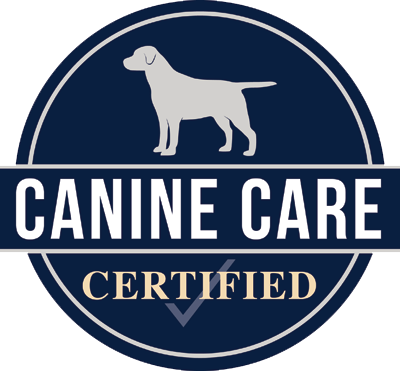Canine Care Certified Standards

The Canine Care Certified Standards of Care were developed by internationally recognized animal science and veterinary medicine leaders with expertise in canine health, behavior, reproduction, nutrition, genetics, and ethics. They are rooted in existing and ongoing scientific research. Certified kennels must follow all of the Standards of Care for parents and pups. The Canine Care Certified seal helps you identify dogs raised under stringent welfare standards. Purchasing a dog from a pet facility that carries Canine Care Certified puppies not only means you can be assured that your puppy and her parents were treated well, it recognizes breeders who continuously improve their care and welfare practices and encourages others to do likewise. This helps you to do your part to ensure that puppy mills cannot thrive.
Canine Care Certified goes above and beyond currently available canine welfare standards programs. The program sets forth rigorous, science-based, expert-reviewed standards for canine physical and behavioral welfare in areas such as nutrition, veterinary care, housing, handling and exercise.
Explore the transformative work of Canine Cares and learn how they are making a difference in the lives of our furry friends at https://vet.purdue.edu/ccc/about.php.
About the Standards
The Standards of Care were created by Dr. Candace Croney, Ph.D. at Purdue University in 2013 based on existing and ongoing research. They were further developed in collaboration with recognized academic and practicing animal science, and veterinary medicine leaders with expertise in diverse canine welfare sciences (e.g., genetics, physical health, and behavior).
Five Pillars of Care
Breeders seeking to be certified must meet or exceed rigorous standards for physical and behavioral welfare in areas such as nutrition, veterinary care, genetics, housing, handling, socialization, enrichment, and exercise.
The Canine Care Certified program provides additional measures of assurance that breeders of certified dogs are attending to their dogs’ physical, genetic and behavioral health, and are committed to continuously raising the bar on the care and attention they offer to their dogs.
Certified breeders must follow the Standards of Care as summarized under the following five pillars. These standards for adult dogs and puppies far exceed current regulatory programs.

Physical Health
Only veterinarians may perform any necessary alterations and surgeries. Breeders must also create comprehensive physical health plans for preventative care and treatment and ensure they are implemented. Genetic and health screening, regular dental care, and grooming are required.

Behavioral Health
Caretakers need to create a behavioral wellness plan, both for preventive care and treatment, as well as provide exercise, meaningful socialization, and enrichment for adult dogs and puppies.

Environment
Breeders must provide safe, enriched, high-quality spaces with access to the outdoors and multiple flooring surfaces.

Breeding life and retirement
Breeders must follow established limits for retirement and humane rehoming. Adult dogs at retirement cannot be sold for research.

Caretaker expectations
Breeders must participate in continuing education on canine care and welfare, must use low-stress handling procedures, and be transparent with stakeholders and compliant with best practices.